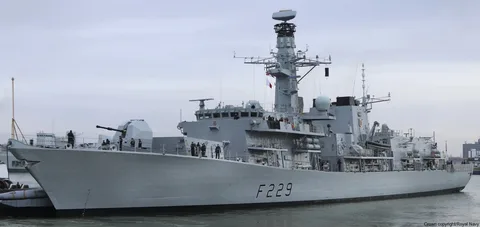In a shocking development that has reignited concerns over sexual misconduct within the UK’s armed forces, the Royal Navy has confirmed that its primary training facility, HMS Raleigh, was placed under a sudden and sweeping communication lockdown following a revenge porn allegation. The incident, which has involved teenage recruits and sparked a full-scale police investigation, comes at a time when the Royal Navy is already grappling with broader leadership scandals and ongoing reputational issues.
This article explores what happened at HMS Raleigh, the wider implications for military policy and conduct, and the cultural context surrounding this latest sex scandal to hit the UK’s senior maritime force.
The HMS Raleigh Lockdown: What Happened?
A Communication Blackout Under River City Protocol
On the surface, the lockdown at HMS Raleigh might appear to be standard protocol for a sensitive investigation. However, the details emerging from this situation point to something far more serious. Sources have confirmed that the base in Torpoint, Cornwall, was subjected to a strict River City state—a Royal Navy term used to denote an information and communication lockdown designed to control and limit the spread of sensitive or damaging information, particularly in crisis scenarios.
Hundreds of recruits, including teenagers as young as 16 and 17, were reportedly ordered to surrender their mobile phones. The purpose: to halt the viral spread of explicit images of a female recruit who was allegedly the victim of revenge porn.
The Message Sent to Parents
Amid growing parental concerns, the Royal Navy issued a carefully worded communication to the families of underage recruits. The message read:
“Welfare calls are being made to under-18s’ parents to say that their recruits are OK but the base is on communication blackout due to an ongoing police investigation.”
This reassured parents that their children were safe, while also underscoring the seriousness of the ongoing investigation. According to officials, the River City protocol could remain in place for up to 96 hours.
Origins of the Incident
While official details remain limited due to the ongoing civilian police investigation, it has been widely reported that the scandal revolves around a prior romantic relationship between two recruits. A male recruit allegedly shared explicit photos of a female recruit without her consent after she joined a separate intake at HMS Raleigh.
According to a source within the Navy:
“They had joined in separate intakes and when the young woman enlisted, some time after her former partner, she discovered that intimate pictures had been shared on the base without her consent. By that point her former partner had already left the Navy. He never completed training.”
Although the alleged perpetrator had already exited the service by the time the incident came to light, the Royal Navy confirmed that only one person was under investigation and that no other recruits were suspected of involvement.
Institutional Response and Cultural Concerns
Royal Navy’s Official Statement
The Royal Navy issued a brief but emphatic statement regarding the welfare of its personnel:
“The welfare of our recruits is our number one priority and a restriction on the use of mobile phones was in place for a short time. A civilian police investigation is ongoing.”
While this statement points to a quick response and an emphasis on well-being, critics have questioned whether enough is being done at a systemic level to prevent these incidents from occurring in the first place.
An Escalating Pattern of Sexual Misconduct
This scandal at HMS Raleigh is not an isolated event. It follows closely on the heels of other disturbing incidents within the senior service. Just days before the lockdown, Admiral Sir Ben Key, the Royal Navy’s most senior officer and First Sea Lord, was suspended over allegations of an inappropriate affair.
In another blow, Lieutenant Commander Martyn Mayger, captain of the offshore patrol vessel HMS Tyne, was stripped of his command amid allegations of “unacceptable sexual behaviour.”
These incidents contribute to an emerging pattern of misconduct and perceived lapses in leadership and discipline within the Royal Navy—issues that some insiders say are becoming increasingly difficult to ignore.
The Legal and Ethical Framework
Understanding Revenge Porn and the Law
Revenge porn—defined as the sharing of intimate images or videos without consent—is a criminal offense in the UK under the Criminal Justice and Courts Act 2015. It carries a maximum sentence of two years’ imprisonment. The offense is taken particularly seriously when minors are involved or when images are distributed within institutional settings like schools, prisons, or in this case, military training bases.
The Royal Navy, as part of the British Armed Forces, is also bound by the Armed Forces Act 2006, which governs service conduct, including provisions related to “conduct prejudicial to good order and discipline.” These regulations make it clear that inappropriate or harmful behavior among service members is subject to military justice, though in this case, civilian authorities are taking the lead.
Challenges of Policing Digital Misconduct
One of the key difficulties in enforcing discipline around digital content within the military stems from the proliferation of smartphones and social media. While the Navy maintains control over communications during sensitive operations or training phases, everyday access to mobile phones and messaging platforms has made it much easier for misconduct to occur—and harder for it to be contained.
Experts argue that while communication blackouts like the one at HMS Raleigh can limit short-term damage, they do little to address the underlying cultural and systemic issues that lead to such behavior in the first place.
Inside HMS Raleigh: Life Under Lockdown
The Recruit Experience
HMS Raleigh is the Royal Navy’s principal training establishment for new recruits. It typically hosts thousands of trainees annually, most of whom are experiencing military life for the first time. The majority of recruits are aged 16 to 24, with those under 18 classified as minors and subject to enhanced welfare protections.
For many young recruits, the sudden lockdown, confiscation of phones, and lack of communication with family created confusion and anxiety. According to insiders, welfare officers were deployed to maintain order and offer emotional support, particularly for the youngest trainees.
Psychological Impact and Aftercare
While the Royal Navy has a comprehensive welfare and pastoral care structure in place, mental health experts warn that the psychological impact of being involved in, or even exposed to, an investigation of this nature can be profound—especially for young recruits.
Clinical psychologist Dr. Rebecca Young, who specializes in trauma among uniformed services personnel, noted:
“The age and developmental stage of these recruits make them particularly vulnerable to trauma. Even indirect exposure to sexually explicit content or institutional crisis can lead to long-term emotional repercussions.”
Ensuring that aftercare and mental health support are robust and accessible will be a key test of the Navy’s commitment to personnel welfare.
Broader Cultural Implications
A Question of Leadership and Accountability
The timing of this scandal could not be worse for the Royal Navy, which is already reeling from senior-level controversies and a broader crisis of confidence in its leadership. With Admiral Sir Ben Key’s suspension, questions are now being asked not just about individual conduct, but about the effectiveness of leadership structures, accountability systems, and internal culture.
Professor David Blake, a defense policy analyst at King’s College London, observed:
“What we’re seeing is not just a series of isolated incidents. We’re seeing signs of a culture that may not be adequately addressing inappropriate behavior—or perhaps even tolerating it at some levels.”
Gender Dynamics in a Traditionally Male-Dominated Space
Despite efforts to make the Navy a more inclusive and equitable institution, many argue that the service remains a highly masculinized environment where inappropriate behavior towards women is still too often brushed aside.
In 2021, a Ministry of Defence report found that female service members in all branches of the armed forces were significantly more likely to experience bullying, harassment, and discrimination than their male counterparts. Incidents of revenge porn, inappropriate sexual comments, and non-consensual behavior were identified as growing areas of concern.
Public Confidence and Media Scrutiny
With tabloid outlets like The Sun leading the charge in publicizing these scandals, the Royal Navy is finding itself under increasing media and public scrutiny. While such exposure can be uncomfortable for the institution, many observers argue that it’s a necessary step toward greater transparency and reform.
Steps Toward Reform and Prevention
Policy Recommendations
Experts and advocacy groups have proposed a series of measures to help prevent future incidents and rebuild trust within the service:
- Stricter vetting and education at intake: Ensure that recruits understand the legal and ethical boundaries of behavior—especially digital conduct.
- Enhanced reporting mechanisms: Create anonymous and secure channels for victims to report misconduct.
- Regular training and refreshers: Mandate frequent workshops on consent, respect, and digital responsibility.
- Accountability from the top down: Hold senior officers to the same (or higher) standards as junior personnel.
The Need for Cultural Change
Ultimately, the Royal Navy will need to go beyond reactive measures and commit to a long-term cultural transformation. This means confronting not only the symptoms but also the root causes of toxic behavior—whether that’s outdated gender norms, poor leadership modeling, or insufficient accountability.
Conclusion
The revenge porn scandal at HMS Raleigh is a disturbing chapter in an ongoing narrative about misconduct and accountability in the Royal Navy. While immediate steps such as communication blackouts and police investigations may help contain the fallout, they are no substitute for meaningful reform.
As the investigation continues, the Navy—and the public—must grapple with tough questions about trust, leadership, and what it means to serve with honor in the 21st century.
If the Royal Navy truly aims to uphold its proud traditions and protect its recruits, then real, systemic change cannot wait.
- Fresh Royal Navy sex scandal as training base dramatically ‘locked down’ over revenge porn claims - May 28, 2025
- Illinois THC Infused Drinks You Should Try - May 23, 2025
- Home Bargains has shoppers racing to nab £3.99 buy to add colour to their gardens & it makes a fab Father’s Day gift too - May 21, 2025







Follow